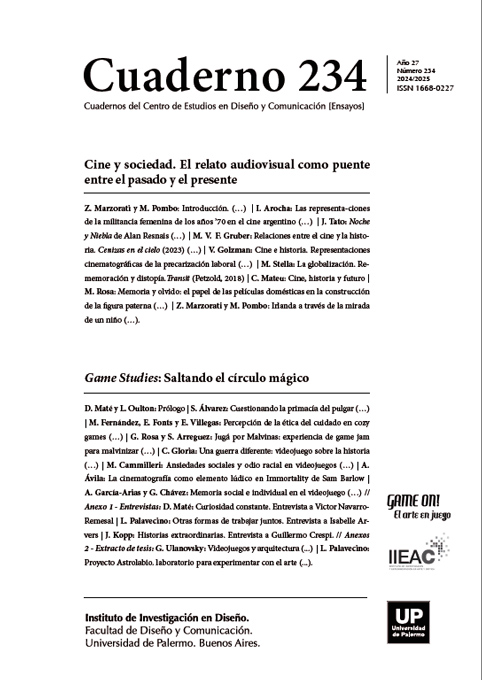Ansiedades sociales y odio racial en videojuegos de terror. The Sinking City y la problematización del mundo ficcional lovecraftiano
Resumen
A partir de la teoría de los mundos ficcionales y la noción de transmedialidad, nos interesa analizar The Sinking City (2019)
Citas
Abbott, H. (3 de julio de 2019). Frogwares Discuss ‘The Sinking City”s Use of Lovecraft, City Creation, and Nintendo Switch Port Changes. Bloody Disgusting. https://bloodydisgusting.com/interviews/3570144/interview-frogwares-discuss-sinking-citys-uselovecraft-city-creation-nintendo-switch-port-changes/
Aarseth, E. (2012). A Narrative Theory of Games. IT University of Copenhagen.
Bochicchio, A. y Miranda, M. (2022). Acerca de eugenesia, monstruos y cine. Estados Unidos durante la década de 1930. Huellas de Estados Unidos. Estudios y debates desde América Latina, 22, pp. 138-156. http://www.huellasdeeua.com/
Cortes, D. T. (2017). El videojuego como texto: una experiencia de exploración de mundos narrativos. Tropelías. Revista de Teoría de la Literatura y Literatura Comparada, 27, pp. 280-288. https://papiro.unizar.es/ojs/index.php/tropelias/article/view/1289
Cox, M. (1992). Victorian Tales of Mystery and Detection: an Oxford Anthology. Oxford University Press.
Fernández Ruiz, M. (2015). Fantastic Universes and H.P. Lovecraft in Survival Horror Games. A Case Study of P.T (Silent Hills). Brumal. Revista de investigación sobre lo fantástico, 3(1), pp. 95-118. https://raco.cat/index.php/Brumal/article/view/297612
Flanagan, K. M. (2023). Head Games: Adapting Lovecraft Beyond Survival Horror. En T. Lazendörfer y M. Dreysse Passos de Carvalho (Ed.), The Medial Afterlives of H.P. Lovecraft. Palmgrave Macmillan.
Frasca, G. (2001). Videogames of the Oppressed: Videogames as Means for Critical Thinking and Debate. [Tesis de Maestría, Georgia Institute of Techonology]. https://ludology.typepad.com/weblog/articles/thesis/FrascaThesisVideogames.pdf
Frye, M. (2006). The Refinement of ‘Crude Allegory’. Eugenic Themes and Genotypic Horror in the Weird Fiction of H.P. Journal of the Fantastic in the Arts, 17(3), pp. 237-254. https://www.jstor.org/stable/26390171
Gómez Gurpegui, C. (2015). La construcción del terror en los videojuegos: Alien Isolation [Tesis de Maestría, Universidad Rey Juan Carlos]. https://www.academia.edu/36297934/La_construcci%C3%B3n_del_terror_en_los_videojuegos_Alien_Isolation
Jenkins, H. (15 de julio de 2003). Transmedia Storytelling. Technology Review. https://www.technologyreview.com/2003/01/15/234540/transmedia-storytelling/
---------. (2004). Game Design as Narrative Arquitecture. En N. Wardrip-Fruin y P. Harrigan (Ed.), First Person: New Media as Story, Perfomance and Game. The MIT Press.
Juul, J. (2005). Half-Real. Video Games between Real Rules and Fictional Worlds. The MIT Press.
Lovecraft, H.P. (1973). Supernatural Horror in Literature. Dover.
Mayer, J. (2016). Race, Species and Others. H.P. Lovecraft and the Animal. En C. H. Sederholm y J. A. Weinstock (Ed.), The Age of Lovecraft. University of Minnesota Press. Oganesyan, S. (1 de marzo de 2018). How We Build the Story in The Sinking City. Frogwares. https://frogwares.com/the-sinking-city-interview-with-narrative-designer/
Perron, B. (2018). The World of Scary Video Games. A Study in Videoludic Horror. Bloomsbury Publishing Inc.
Rouse, R. (2009). Made in Hell: The Inevitable Success of the Horror Genre in Video Games. En B. Perron (Ed.), Horror Video Games. Essays on the Fusion of Fear and Play. McFarland & Company, Inc.
Ryan, M. L. (2014). Storyworlds across Media: Toward a Media-Conscious Narratology. University of Nebraska Press.
Wolf, S. (2001). Cine/Literatura. Ritos de pasaje. Paidós.
Wood, R. (1979). Introduction to the American Horror Film. En R. Wood y R. Lippe (Ed.), American Nightmare: Essays on the Horror Film. Festival of Festivals.
Los autores/as que publiquen en esta revista ceden los derechos de autor y de publicación a "Cuadernos del Centro de Estudios de Diseño y Comunicación", Aceptando el registro de su trabajo bajo una licencia de atribución de Creative Commons, que permite a terceros utilizar lo publicado siempre que de el crédito pertinente a los autores y a esta revista.


